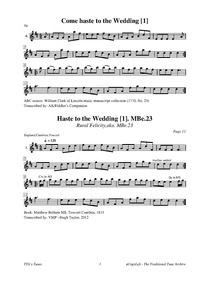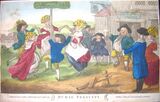Template:Pagina principale/Vetrina: Difference between revisions
No edit summary |
No edit summary |
||
| Line 1: | Line 1: | ||
{{SheetMusic | {{SheetMusic | ||
|f_track= | |f_track=Haste to the Wedding 1.mp3 | ||
|f_pdf= | |f_pdf=Haste to the Wedding(1).pdf | ||
|f_artwork= | |f_artwork=Ruralfelicity.jpg | ||
|f_tune_name= | |f_tune_name=Haste to the Wedding | ||
|f_track_title= | |f_track_title=Haste_to_the_Wedding_(1) | ||
|f_section=abc | |f_section=abc | ||
|f_played_by=[https://www.discogs.com/ | |f_played_by=[https://www.discogs.com/artist/289133-Ronan-Browne Ronan Browne] | ||
|f_notes= | |f_notes=Rural Felicity - Printed for & Sold by Bowles & Carver. N. 69 in St. Paul Church Yard - London. | ||
|f_caption= | |f_caption=Come haste to the wedding, ye friends and ye neighbours,{{break}} | ||
|f_source=[https:// | The lovers their bliss can no longer delay;{{break}} | ||
Forget all your sorrows, your care, and your labours,{{break}} | |||
And let ev'ry heart beat with rapture to-day:{{break}} | |||
|f_source=[https://tunearch.org/w/images/d/d2/Haste_to_the_Wedding_1.mp3 TTA] | |||
|f_pix=420 | |f_pix=420 | ||
|f_picpix=200 | |f_picpix=200 | ||
|f_article=[[ | |f_article=[[Haste_to_the_Wedding_(1) | '''Haste to the Wedding''']] | ||
This version was sometimes known as the Manx tune and was printed by the Percy Society in 1846, but it appears as well in numerous songsters of the late 18th and 19th centuries, including '''The Jovial Songster''' (1800), '''The Nightingale''' (1802) and Charles Wilson's '''The Myrtle and Vine; or, Complete Vocal Library''' (1803). | |||
It is the basis of the Manx ballad, 'The Capture of Carrickfergusby,' written by Thurot in 1760 (Linscott, 1939). Samuel Bayard (1944, 1981) comments on the popularity of the air over the past two centuries as well as the tenacity of the main title to stick with the tune. When Chappell printed his well-known set in '''National English Airs''' (1840, I, No. 163; notes, II, 129; reprinted in JEFDSS, III, 210), he traced the tune to the year 1767, when it was used in pantomime, to a song beginning 'Come, haste to the wedding, ye friends and ye neighbors!' | |||
This version of the air, continues Bayard, is still the earliest known, and it may be that the popularity of the song occasioned the fixed quality of the title. In his 1944 work Bayard poses the question as to whether the words were included in the original pantomime as a result of its associations, or whether the later uses of the tune secured it. | |||
However, the tune's appearance under the title "[[Small Pin Cushion (The)]]" in cellist-composer James Oswald's '''Caledonian Pocket Companion, Book 10''' (London, 1760), and the Manx "Capture of Carrickferusby" both predate the pantomime. | |||
At best, the provenance of the tune is yet to be discovered although it would appear to have Gaelic origins, and it may even be that it was Oswald's composition. | |||
}} | }} | ||
Revision as of 12:53, 18 May 2024

The lovers their bliss can no longer delay;
Forget all your sorrows, your care, and your labours,
And let ev'ry heart beat with rapture to-day:
Played by: Ronan Browne
Source: TTA
Image: Rural Felicity - Printed for & Sold by Bowles & Carver. N. 69 in St. Paul Church Yard - London.

This version was sometimes known as the Manx tune and was printed by the Percy Society in 1846, but it appears as well in numerous songsters of the late 18th and 19th centuries, including The Jovial Songster (1800), The Nightingale (1802) and Charles Wilson's The Myrtle and Vine; or, Complete Vocal Library (1803).
It is the basis of the Manx ballad, 'The Capture of Carrickfergusby,' written by Thurot in 1760 (Linscott, 1939). Samuel Bayard (1944, 1981) comments on the popularity of the air over the past two centuries as well as the tenacity of the main title to stick with the tune. When Chappell printed his well-known set in National English Airs (1840, I, No. 163; notes, II, 129; reprinted in JEFDSS, III, 210), he traced the tune to the year 1767, when it was used in pantomime, to a song beginning 'Come, haste to the wedding, ye friends and ye neighbors!'
This version of the air, continues Bayard, is still the earliest known, and it may be that the popularity of the song occasioned the fixed quality of the title. In his 1944 work Bayard poses the question as to whether the words were included in the original pantomime as a result of its associations, or whether the later uses of the tune secured it.
However, the tune's appearance under the title "Small Pin Cushion (The)" in cellist-composer James Oswald's Caledonian Pocket Companion, Book 10 (London, 1760), and the Manx "Capture of Carrickferusby" both predate the pantomime.
At best, the provenance of the tune is yet to be discovered although it would appear to have Gaelic origins, and it may even be that it was Oswald's composition.
...more at: Haste to the Wedding - full Score(s) and Annotations
X:0 T:Come haste to the Wedding [1] M:6/8 L:1/8 R:Jig S: William Clark of Lincoln music manuscript collection (1770, No. 25) Z:AK/Fiddler's Companion K:D V:1 clef=treble name="0." [V:1] A|AFG Aaf|ede fdB|AFA BdF|EEE E2A| AFG Aaf|ede fdB|AFA faf|ddd d2:| |:a|(af)a (af)a|(bg)b (bg)b|afa agf|eee e3| a3f3|ede fdB|AFA faf|ddd d2:|]
